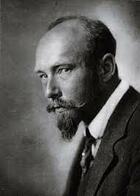
Hermann Alexander Graf Keyserling was born in the Russian Empire, in Livonian (present-day Estonia), on July 20, 1880, into an aristocratic family. After finishing his first studies, he went around the world that would serve as a source for him to write his most important book: A Philosopher's Travel Diary (1919).
After the Russian Revolution, the loss of his property and nationality, he went to Germany, where he founded the Society for Free Philosophy and a magazine that exerted great influence on the cultural life of Europe. In 1919 he married Maria Goedela von Bismarck-Schönhausen, Otto von Bismark's granddaughter, and had a son, Arnold Keyserling.
Hermann Graf Keyserling is considered one of the best cultural popularizers in Europe of the early 20th century and the most important non-academic philosopher of his time in Germany. Some see in him the reconciliation between Nietzsche and Spengler, the two icons of irrationality. Henri Lichtenberger, Nietzsche's French translator, wrote: 'Keyserling is one of the greatest Europeans of our time, one of those who did the most to make our painful transitional period realize what it is and should be, one of the first prophets of the new age.
Keyserling was an important reference for Zweig, who was impressed after meeting him, as he told by letter (11-11-1927) to his first wife Fritzi. In fact, another of his books was a decisive influence on Zweig writing his book Brazil. "Keyserling had presented South America as a living hope," Zweig told his friend and translator Cahn while preparing for his trip to Argentina in 1932.
Enemy of the rise of Nazism in Germany, during World War II he fled to Austria. He passed away in Innsbruck at the age of 65.





